Shaykh Husain from Islamic Center of Chicago – Lectures
Posted in Daily IslamAugust 6, 2012No comments
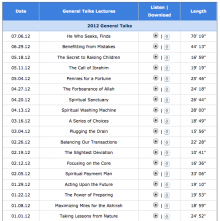
Posted in Daily IslamAugust 6, 2012No comments

Posted in Daily Islam,QuranAugust 6, 2012No comments
Say: I seek refuge in the Lord of men,
The King of men,
The god of men,
From the evil of the whisperings of the slinking (Shaitan),
Who whispers into the hearts of men,
From among the Jinn and the men.
Posted in Daily Islam,HadithAugust 3, 2012No comments
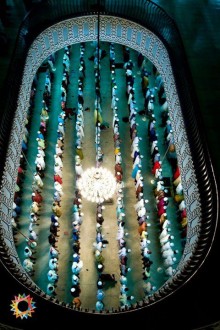
Abu Hurairah {R.A} reports that Nabi {S.A.W} in a Hadith Qudsi narrated that Allah Ta’ala says: I treat My slave according to his expectations from Me. I am with him when he remembers Me; and if he remembers Me in his heart, I remember him in My Heart; and if he remembers Me in a gathering, I remember him in a better and nobler gathering [of Angels]. If he comes closer to Me by one span, I go closer to him an arm’s length; if he come towards Me an arm’s length; I go toward him two arm’s length; and if he come to Me walking I run to him.
{Bukhari}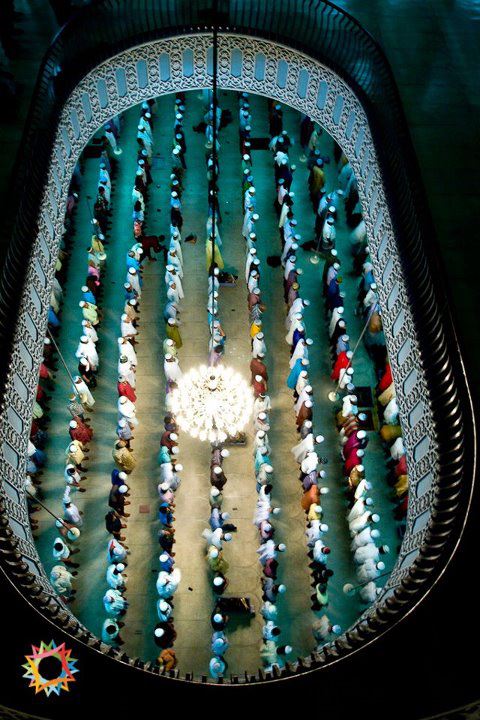 PHOTO CREDIT capturethespiritoframadan.org
PHOTO CREDIT capturethespiritoframadan.org
Posted in Daily Islam,HadithAugust 2, 2012No comments
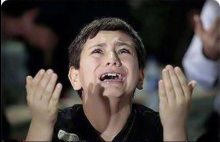
The Prophet [S.A.W] said:
The tears that fall from the eyes of a truthful believer, out of the fear of Allah The Most Merciful, and then roll down his face, however little they are, even (though they be) of the size of the head of a fly, shall prevent the Fire of Hell from touching his face.” [Ibn Majah].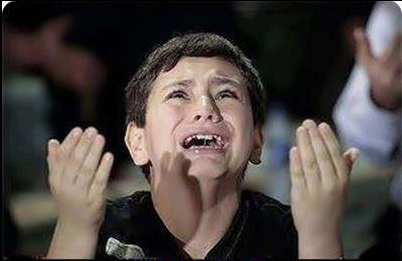
Posted in Daily Islam,HadithAugust 2, 2012No comments
The Prophet (Sallallähu alaihi wa sallam) Said, “There are three solid truths:
1. If a person is wronged and he forbears it (without seeking revenge) just for the sake of Allah (SWT), Allah will honour him and give him the upper hand with His help;
2. If a person opens a door of giving gifts for cementing relationships with relatives, Allah will give him abundance;
3. If a person opens a door of seeking charity for himself to increase his wealth, Allah will further reduce his wealth.’
(Reported from Aboo Hurairah inMishkaah and Musnad Ahmad).
Posted in Daily Islam,Hadith,QuranAugust 1, 2012No comments
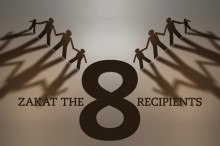
“Alms (Zakat) are for the poor and the needy, and those employed to administer the (funds); for those whose hearts have been (recently) reconciled (to Truth); for those in bondage and in debt; in the cause of Allah; and for the wayfarer: (thus is it) ordained by Allah, and Allah is full of knowledge and wisdom.” (Surah Al Tawbah 9:60)
One of the five pillars of Islam, Zakat is a purification for one’s wealth, freeing one from the love of possessions by encouraging humility and discipline. An essential principle of Islam is that everything belongs to Allah. We do not own our wealth, but have been entrusted with worldly possessions by Him.
Zakat means ‘purification’ and ‘growth’; possessions are purified by setting aside a portion for those in need, and like the pruning of plants, this cutting back encourages new growth.
The annual payment of zakat is different to any charitable gifts given out of kindness or generosity, otherwise known as sadaqah. Zakat is a mandatory religious obligation and forms the systematic giving of 2.5% of one’s net wealth each year, benefitting targeted recipients on a sustained basis.
From the Quranic verses ordaining zakat, eight classes of recipients have been identified by the scholars. As Ramadan approaches, we need to organise ourselves to reach out and distribute support to the eight beneficiaries of zakat.
Posted in Daily Islam,HadithJuly 31, 2012No comments
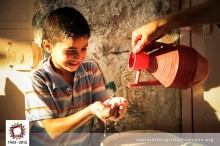
Narrated Humran:
I saw ‘Uthman bin ‘Affan asking (for a tumbler of water) to perform ablution (and when it was brought)
he poured water from it over his hands and washed them thrice and then put his right hand in the water container and rinsed his mouth and washed his nose by putting water in it and then blowing it out.
Then he washed his face thrice and (then) forearms up to the elbows thrice, then passed his wet hands over his head and then washed each foot thrice.
After that ‘Uthman said,
“I saw the Prophet performing ablution like this of mine, and he said, ‘If anyone performs ablution like that of mine and offers a two-rak’at prayer during which he does not think of anything else (not related to the present prayer) then his past sins will be forgiven. ‘
PHOTO CREDIT : capturethespiritoframadan.org
Posted in Daily Islam,QuranJuly 31, 2012No comments
Do they not reflect on themselves? Allah created the heavens and the earth and whatever lies between them in Truth and for an appointed term. Yet many people deny that they will meet their Lord. [30:8]
Posted in Daily IslamJuly 30, 2012No comments

Hasan al-Basri (rahimaullah) was an eminent scholar and pious individual of his time. He would rarely laugh due to his remembrance of death and the punishment of hell. One day he was going somewhere when he saw a young man indugled in laughter. Hasan al-Basri asked the youth, “Young man, have you already crossed the bridge of Sirath? Have you already found out whether you are going to paradise or hell?” The young man replied, “No.” Hasan al-Basri told him, “Then why are you laughing so much?” After that, no one saw this young man laughing again as he came to know the reality of this life.
Source: Story extracted from the book “Tambihul Ghafileen” by Shaikh Abul Laith Samarkandi.
Many hours or probably days have passed away from our lives in laughter and jokes. It is a sign that we have forgotten the life of the hereafter. The sahabah used to do good deeds all day but still cry during the night to Allah. On the other hand, we do sins all day and still have no concerns! It is permissible to laugh at amazing things and smile while being in company of others.
Posted in Daily IslamJuly 30, 2012No comments
Posted in Daily IslamJuly 30, 2012No comments
DUA AT THE TIME OF IFTAAR
A MOST BEAUTIFUL HADITH Once Moosa (Moses) (AS) asked Allah Taala: O Allah ! you have granted me the honor and privilege of talking to you directly, Have you given this privilege to any other person? Allah Taala replied, O Moosa during the last period I am going to send an ummat, who will be the Ummat of Mohammed with dry lips, parched tongues, emaciated body with eyes sunken deep into their sockets, with livers dry and stomachs suffering the pangs of hunger- will call out to me (in dua) they will be much much closer to me than you O Moosa! While you speak to me there are 70000 veils between you and me but at the time of iftaar there will not be a single veil between me and the fasting Ummati of Mohammed . Please confirm us the authenticity of this …its being spread on net.
Praise be to Allah.
This hadeeth is not part of the Prophet’s Sunnah, and it is not something that is known to the scholars and muhaddithoon in their books and Musnads. It is not narrated except in a few books whose authors filled them with fabricated reports, false reports, stories and myths, such as Nuzhat al-Majaalis wa Muntakhab al-Nafaa’is, by the historian and man of letters ‘Abd al-Rahmaan ibn ‘Abd al-Salaam al-Safoori (d. 894 AH) – pp. 182-183, Chapter on the virtue of Ramadaan and encouragement to do good deeds therein. It also appears in the tafseer Rooh al-Bayaan (8/112) by Ismaa’eel Haqqi al-Hanafi al-Khalooti (d. 1127 AH). They mentioned a hadeeth similar to that referred to by the questioner, in which it says: “Moosa (peace be upon him) said: ‘O Lord, You have honoured me by speaking to me directly. Will You give anyone else something like this?’ And Allaah revealed: ‘O Moosa, I have slaves whom I will bring forth at the end of time, and I will honour them with the month of Ramadaan, and I will closer to one of them than to you, because you have spoken to Me when there are seventy thousand veils between Me and you, but when the ummah of Muhammad (peace and blessings of Allah be upon him) fasts until their lips turn white and their faces turn yellow, I will lift the veil between Me and them at the time they break their fast. O Moosa, glad tidings to the one whose liver thirsts and whose stomach hungers in Ramadaan.”
Moreover, in the matn (text) of this hadeeth there is something which indicates that it is munkar (i.e., unsound), which is the words “I will be closer to one of them than you” – referring to Moosa (peace be upon him). It is well known in Muslim belief that the Messengers and Prophets are better than all other humans, and Moosa is one of the Messengers of strong will, so how can Allaah be closer to His slaves than to His Prophet Moosa (peace be upon him), of whom He said (interpretation of the meaning): “And We called him from the right side of the Mount, and made him draw near to Us for a talk with him” [Maryam 19:52]? And Ibn ‘Abbaas (may Allah be pleased with him) said: He drew so close that he heard the scratching of the Pen – i.e., writing the Tawraat (Torah). See: Tafseer al-Qur’aan il-‘Azeem by al-Haafiz Ibn Katheer (5/237).
Posted in Daily Islam,QuranJuly 30, 2012No comments
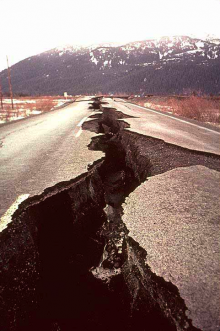
بسم الله الرحمن الرحيم
When the earth is shaken with its [final] earthquake
And the earth discharges its burdens
And man says, “What is [wrong] with it?” –
That Day, it will report its news
Because your Lord has commanded it.
That Day, the people will depart separated [into categories] to be shown [the result of] their deeds.
So whoever does an atom’s weight of good will see it,
And whoever does an atom’s weight of evil will see it.(99:1-8)
Posted in Daily Islam,HadithJuly 30, 2012No comments
“Abdullah ibn Abbas (radi Allahu anhu) said that the Messenger of Allah (sal Allahu alaihi wa sallam) used to teach them this supplication in the same way that he used to teach them a Surah of the Quran. He would say: ‘O Allah, I seek refuge with You from the punishment of Jahannum and I seek refuge with You from the punishment of the grave. I seek refuge with You from the trial of the Masih ad-Dajjal and I seek refuge with You from the trials of life and death.’” [Sahih Muslim]
Firstly, this hadith tells us that the punishment of Jahannum is a reality, the punishment of the grave is a reality, the Fitnah of Dajjal (anti-Christ) is something very serious, and that there are trials in both life and death.
Secondly, this hadith also indicates the severity of various punishments and trials. The order in which the Messenger of Allah (sal Allahu alaihi wa sallam) sought refuge from them is indicative of their seriousness. The worst that could happen to a person is that they get thrown into Jahannum. The next worst thing that could happen to them is for them to be punished in their grave. Then comes the severity of the Fitnah of Dajjal, then other trials that afflict people at different times in their lives.
Even without revelation the Arabs knew that strange things happened in graves. If their horses got stomach ailments they would take them to graveyards. The horse would jump and twist so violently that its cramps would straighten away. The Prophet (sal Allahu alaihi wa sallam) told us that the punishment of the grave is heard by all creatures except men and Jinn, and that if we were cognizant of it we wouldn’t bury our dead.
The greatest trial of the living will be at the hands of Dajjal. Other than that there are numerous trials people go through as a result of which they are purified of their sins, as metal is purified from its ore through burning.
Trials also separate the wheat from the chaff. People will be rewarded according to the level of suffering they have patiently borne, and the trials they have dealt with keeping their Eeman intact.
We should try to keep the ingredients of this Dua in our prayers.
Posted in Daily Islam,HadithJuly 30, 2012No comments

The Prophet (sal Allahu alaihi wa sallam) said: “The dearest parts on the face of the earth near Allah are its mosques, and the most hated parts near Allah are its markets.” [Sahih Muslim]
The superiority of the mosques is obvious. People pray and worship Allah (subhana wa ta’ala) in mosques. They recite the Quran in it and encourage one another to obey Allah (subhana wa ta’ala). The mosque in the time of the Prophet (sal Allahu alaihi wa sallam) was also the head quarters of the Islamic State. Foreign delegations were received there, the consultative assembly was held in Masjid-e-Nabwi, and all matters of state were discussed therein.
On the other hand, malls and bazaars are where people forget Allah (subhana wa ta’ala). The adhan and time of prayer go unnoticed. Shaitaan makes us indulge in such forbidden acts as fraud, lying, gossiping, checking people out and wasting money.
Malls and bazaars are disliked for the many sins that are likely to occur in them, not least of which is taking Allah’s blessings and favours for granted. Shops taunt us with their glittery ware, flaunting before us all that we do not possess of material goods, while possessing these things is of no value to our everlasting life. We end up wasting our money which we could have used to come closer to Allah (subhana wa ta’ala).
Spending more time than necessary in market places is also a waste of another precious commodity: time. “Hanging out”, “window shopping” and “killing time” are the very antithesis of an Islamic understanding of life. During an exam does any sane person do anything except focus on getting the exam questions answered correctly? We are in an exam until we die. What we do every second that we are alive, counts in the final assessment. We can’t afford to waste time. The purpose of life is simply to qualify for Allah’s Grace and His granting us everlasting happiness in Jannah. There is no other purpose to life.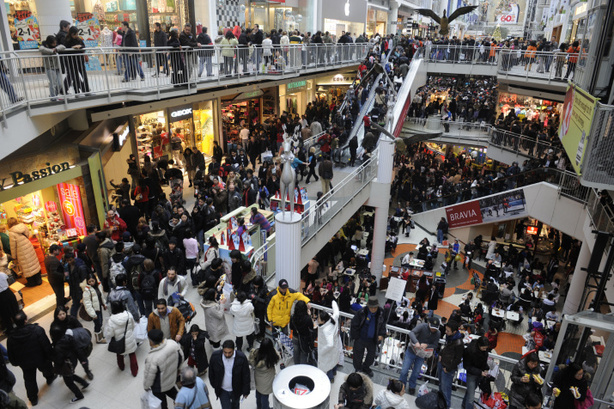
Posted in Daily IslamJuly 26, 2012No comments

I woke up at 4:20 am this morning, ate four hard-boiled eggs and a blueberry bagel, swallowed down a cup of coffee, and sat down to pray.
And I haven’t eaten or had a drink since.
The clock reads 6:26 pm, and I still have over two hours to go.
This is the first day of Ramadan, the holiest month for Muslims around the world. For thirty days, Muslims fast from all food and drink from sunrise to sunset.
Oh, and me, too.
I decided to observe Ramadan this year, for a number of reasons which I will explain over the next thirty days. I plan to blog about the experience, too.
I have tried my hand at fasting in many different ways over my lifetime, most recently with a regular Friday fast from sunrise to 3 pm. Fasting has never come easy for me – that may be the point!? – but I have certainly come to value the spiritual rigor and discipline of abstaining from food for extended periods of time.
We American Christians aren’t really all that good at fasting; it’s never been high on our list of spiritual disciplines. Even in the one season of the church calendar in which we are supposed to fast, Lent, we manage to find ways to minimize and downplay the sacrificial aspect of the fast. We give up chocolate or soft drinks for an entire forty days – woohoo, that should bring us closer to Christ!
That’s why I’ve always been fascinated by the extreme fasting that most Muslims practice during Ramadan – no food or drink during daylight for thirty whole days!
Recently, I’ve felt a little stale, dry even, in my own spiritual life. I do the normal, daily things; I go through my regular routine of prayer and Bible reading. But it doesn’t seem as rich and as profound. I’ve found myself deeply distracted by things happening in the world, including the great hubbub in the North Texas Conference of the United Methodist Church, concerning the status of the denomination and the fate of our particular bishop.
I took a meeting with my good friend, Shaikh Yaseen, the imam (religious leader) of a mosque in Plano, part of the Islamic Association of Collin County. We have been friends for several years, and recently I attended the dedication of the new wing of the mosque.
When I told him that I was considering observing Ramadan, he grinned and said, “Brilliant!” in his British accent. “It’s intense, you know.”
I informed him that I was well aware of what such a commitment meant, but asked him to give me a deeper understanding of what it meant.
“Ramadan is a fast of the body, of course,” he said. “But even more importantly, it’s a fast of the hands and feet and eyes, and finally, of the mind. It’s a time to become very aware of God and to be completely obedient.”
I am intrigued by the fact that “Islam” means “submission,” and that, fundamentally, the Islamic faith is an attempt to practice submission to God’s will on a daily basis. This is not a foreign idea to Christians – this was Jesus’ stated approach, as well. He famously said, in the Garden of Gethsemane, “Not my will, but yours be done.” He also once said that whoever did the will of his Father in heaven, were his brother and sister and mother.
The core of both Islamic and Christian faith is the quest to know, and to live within, the will of the one God.
Yaseen went on to explain that, during Ramadan, Muslims read through the Quran, make special financial gifts for the needy, and attend prayer time at the mosque daily. It is, in fact, a month of searching, of devotion, of love of God and neighbor. It is a living symbol of one’s hunger and thirst for the true God.
That’s what appeals to me in my current spiritual tepidity. I feel as if I need a jolt to my senses. And I know that observing Ramadan will deliver a burst of hungering and thirsting for God – a God whom Muslims call “Allah,” and whom Christians call “Father.”
But there’s another reason that I have chosen to “act like a Muslim” over the next thirty days. I truly want to stand in solidarity with my friend, Yaseen, and his congregation in Plano. I want them to know that I do not resent their presence in my community and country. In fact, I am very glad that they are here.
Not only do I stand with the Plano Muslims, but I have also begun to make friends with Muslim refugees from Iraq, Somalia, and Sudan. I’ve previously blogged about Mohammed, a young Sudanese Muslim who often attends New Day. The last time I served him Communion, he asked if he could pray “for the food” first. After he prayed in Arabic, I happily offered him the bread and cup, symbol of Jesus’ love and sacrifice.
I get to return the favor now. By turning down food and drink during Ramadan, I begin to wear Mohammed’s shoes, live a small part of his life, and catch a glimpse of his own religious commitments and devotion.
I don’t know if I can truly love Mohammed until I do this. I don’t believe that I can truly be Yaseen’s friend until, and unless, I attempt to enter into his story, into his life narrative. I must know what it is like to worship God as a Muslim.
Perhaps then I will learn how to worship God … as a Christian.
If I can just make it until 8:37 …